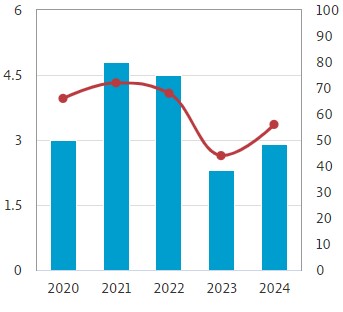CRACKING THE CODE OF E-LEARNING RETENTION: THE IMPACT OF EXPERIENCE IN CHINA USING PLS-MGA
Keywords:
E-Learning, eLearning, continuance usage intention, course trial, perceived cost, information quality, service quality, satisfaction, technology continuance theoryAbstract
Aim/Purpose
Chinese customers are now employing B2C E-Learning as a novel method to get an education. The issues of product homogenization, low user registration eagerness, and poor retention have become noticeable. The purpose of this research is to identify key elements that influence consumers’ intention to continue using E-Learning in China and to examine how user experience moderates the relationship between satisfaction and continuance usage intention (CUI) among users with varying levels of experience. The framework was built by including additional new factors into the Technology Continuance Theory (TCT) theory.
Background
In the present day, B2C E-Learning is expanding quickly, and the E-Learning market is promising and has emerged as a new, widely recognized industry. The post-pandemic period and mobile Internet usage have powered the B2C ELearning industry’s explosive growth. Nonetheless, post-pandemic research on B2C E-Learning is still in its early stages and lacks a complete framework.
Methodology
The framework was built by including additional new factors into the TCT theory. A web-based survey was conducted among 493 E-Learning users in China. Structural equation modeling was conducted, and the results were examined using SPSS and SmartPLS.
Contribution
This research significantly enhances the theory of TCT by incorporating previously unaddressed components (course trial, perceived cost, information quality, and service quality). The novelty of this study is that it focuses on brand-
Accepting Editor Dale Trott │Received: September 2, 2024│ Revised: November 11, November 26, 2024 │ Accepted: November 28 2024.
Cite as: Jin, K., & Normalini, M. K. (2025). Cracking the code of e-learning retention: The impact of experience in China using PLS-MGA. Interdisciplinary Journal of Information, Knowledge, and Management, 20, Article 1. https://doi.org/10.28945/5406
(CC BY-NC 4.0) This article is licensed to you under a Creative Commons Attribution-NonCommercial 4.0 International License. When you copy and redistribute this paper in full or in part, you need to provide proper attribution to it to ensure that others can later locate this work (and to ensure that others do not accuse you of plagiarism). You may (and we encourage you to) adapt, remix, transform, and build upon the material for any non-commercial purposes. This license does not permit you to use this material for commercial purposes.
new technological factors and identifies key factors. Aside from theoretical implications, the research has several implications for designers, developers, companies, marketing personnel, and end-users.
Findings
The results indicated satisfaction is the most significant predictor of continuance usage intention (CUI). Course trials and information quality were insignificant in terms of satisfaction, whereas there was a significant association between perceived cost, service quality, and satisfaction towards CUI. The experience did not moderate the relationship between satisfaction and CUI. The PLSMGA results show that less experienced and more experienced users have no significant difference in continuance usage intention when they are satisfied.
Recommendations for Practitioners
The research results have various implications for designers, developers, businesses, marketing representatives, and end users. Based on these determinants, organizations can develop more effective marketing strategies.
Recommendations for Researchers
Researchers on this specific application can make use of the extension of the model. Researchers will have a comprehensive perspective on B2C E-Learning platforms through the holistic new research framework.
Impact on Society
According to research, Chinese people use E-learning platforms for many reasons, including studying English and improving their personal lives. With this in mind, E-Learning platforms should include tools that allow users to manage their learning and lifestyle better.
Future Research
Future research should employ longitudinal designs to better understand how users’ perceptions and behaviors evolve over time. Second, the use of a nonprobability sampling technique and the focus on Chinese users limit the generalizability of the findings to other contexts. Future studies should replicate the proposed model in different cultural and educational settings to assess its external validity.





